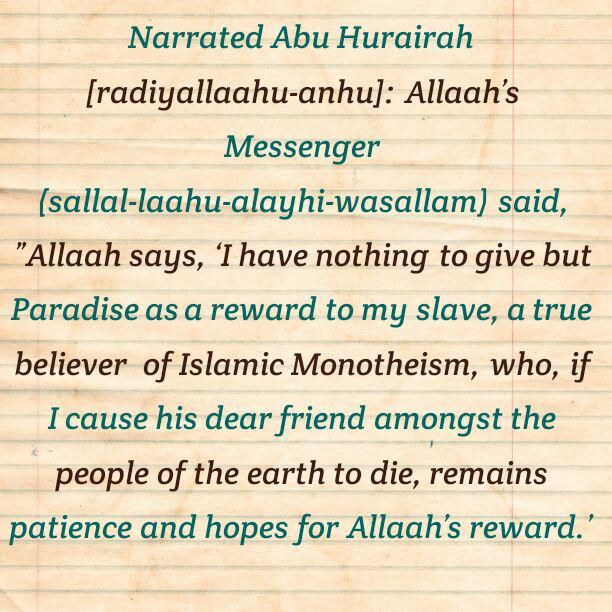Tag: softening the hearts
This is mostly what happens—Imaam Ibn Rajab (rahiahullaah)
Written by Amjad Khan on . Posted in Calling To Islam - 'Da'wa', Morals and Manners - 'Akhlaaq', Purification of The Soul, Scholars of Islam.
See Link
Softening the hearts—‘’Had Allaah’s Messenger not forbidden us to invoke Allaah for death….
Written by Jallow Abdullah on . Posted in Calling To Islam - 'Da'wa', Purification of The Soul, Scholars of Islam, The Salaf - Pious Predecessors.
Narrated Qais: I heard Khabbab, who had branded his abdomen with seven brands, saying, “Had Allah’s Messenger not forbidden us to invoke Allah for death, I would have invoked Allah for death. The companions of Muhammad have left this world without taking anything of their reward in it but we have collected of the worldly wealth what we cannot spend but on earth.” [1]
Concerning the statement of Khabbaab (radiyallaahu-anhu): ”The companions of Muhammad have left this world without taking anything of their reward in it”; Imaam Abdul-Azeez Bin Baaz (rahimahullaah) said: They died upon tremendous good and did not reach the adornments of this worldly life. [2]
And concerning Khabbaab’s (radiyallaahu-anhu) statement:”But we have collected of the worldly wealth what we cannot spend but on earth”; Imaam Abdul-Azeez Bin Baaz (rahimahullaah) said: ”(Spent) on castles and houses.” [3]
————————————————————————————————————————————–
References:
Ref: 1. Saheeh Al-Bukhaari Vol 8. No: 6430
Refs: 2 & 3. Al-Hulalul Ibreeziyyah Min At-Taliqaat Al-Baaziyyah Alaa Saheeh Al-Bukhaari.
Vol 4. Page: 229. Footnotes 4 and 5]
Softening the hearts–Warning against competing in worldly pleasures and amusements
Written by Amjad Khan on . Posted in Brotherhood, Calling To Islam - 'Da'wa', Morals and Manners - 'Akhlaaq', Purification of The Soul, Scholars of Islam, The Salaf - Pious Predecessors.
Narrated Abu Sa’eed (radiyallaahu-anhu): Allah’s Messenger (sallal-laahu-alayhi-wasallam) said: “The thing I am afraid of most for your sake, is the worldly blessings which Allah will bring forth to you.” It was said, “What are the blessings of this world?” The Prophet (sallal-laahu-alayhi-wasallam) said, “The pleasures of the world.” A man said, “Can the good bring forth evil?” The Prophet kept quiet for a while till we thought that he was being inspired divinely. Then he started removing the sweat from his forehead and said,” Where is the questioner?” That man said, “I (am present).” Abu Sa’id added: We thanked the man when the result (of his question) was such. The Prophet said, “Good never brings forth but good. This wealth (of the world) is (like) green and sweet (fruit), and all the vegetation which grows on the bank of a stream either kills or nearly kills the animal that eats too much of it, except the animal that eats the Khadira (a kind of vegetation). Such an animal eats till its stomach is full and then it faces the sun and starts ruminating and then it passes out dung and urine and goes to eat again. This worldly wealth is (like) sweet (fruit), and if a person earns it (the wealth) in a legal way and spends it properly, then it is an excellent helper, and whoever earns it in an illegal way, he will be like the one who eats but is never satisfied.” [1]
Imaam Abdul-Azeez Bin Baaz (rahimahullaah) said: The Prophet (sallal-laahu-alayhi-wasallam) clarified that good only brings good. Wealth is not absolute goodness, rather it is a trial. So whoever spends it in its rightful (place), then it is good; and whoever spends it in dubious ways, then it will be bad for him, such as the eater of the khadira (i.e. a kind of vegetation); but it becomes safe and sound when it defecates and urinates. [2]
———————————————————————————————–
[1] Saheeh Bukhaari Vol 8. Hdeeth Number 6427]
[2] Al-Hulalul Ibreeziyyah. Vol 4.page: 229. Footnote: 1]
Softening the hearts-Paradise is for the one who exercises patience after losing a beloved one!
Written by Jallow Abdullah on . Posted in Scholars of Islam, Worship - 'Ibaadah'.
Narrated Abu Hurairah [radiyallaahu-anhu]: Allaah’s Messenger (sallal-laahu-alayhi-wasallam) said, ”Allaah says, ‘I have nothing to give but Paradise as a reward to my slave, a true believer of Islamic Monotheism, who, if I cause his dear friend amongst the people of the earth to die, remains patience and hopes for Allaah’s reward.’ [1]
Imaam Abdul-Azeez Bin Baaz (rahimahullaah) said: ‘Dear friend: This means his beloved one, brother, father or wife. If he remains patient and hopes for Allaah’s reward, he will receive [the reward] of Paradise.
[1]Saheeh Al-Bukhaari : hadeeth Number 6423]
[2] [Al-Hulalul Ibreeziyyah Vol 4. Page: 226. Footnote 4]
